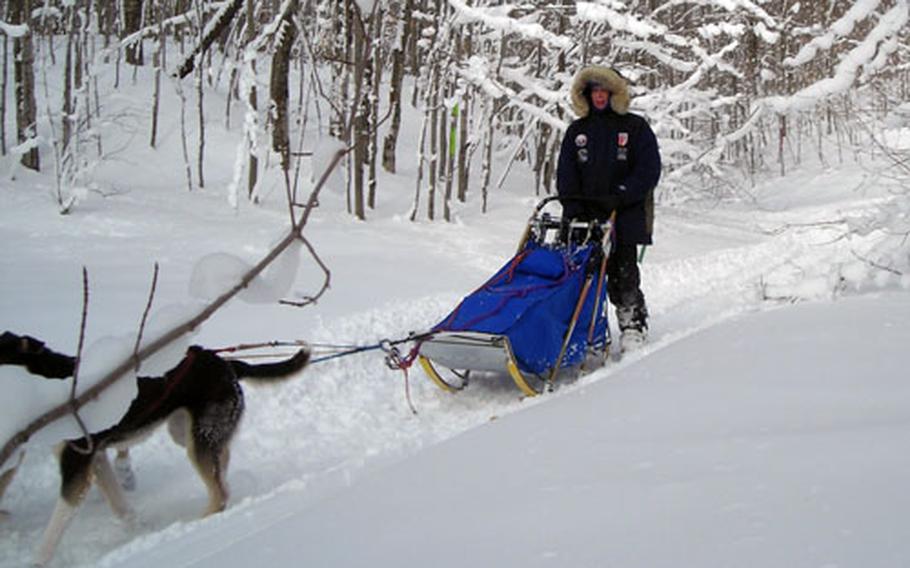
Rodney Whaley, 56, a master Sgt. in the Tennessee National Guard, competes in the 2008 Iditarod. Whaley was the first Tennessean to qualify for the race and was the first competitor sponsored by the National Guard. (Courtesy Staff Sgt. Shawn Woodward)
Halfway into the 1,100-mile Iditarod dogsled race, Master Sgt. Rodney Whaley knew his dogs wouldn’t make it to the finish line in Nome, Alaska. He had to make the call whether to push on, or drop out.
“I know I did the right thing, but it really hurts to do it,” Whaley said.
After racing more than 500 miles over nine days and without much sleep, Whaley, a Tennessee National Guardsman, dropped out of what is billed as “The Last Great Race.”
Though some of the most difficult terrain in the race was behind him, Whaley took a blow when he had to leave his lead dog at a race checkpoint. The dog became tangled in the ropes connecting it to the team and was injured. He moved a trusted female dog to the lead, but she went into heat. That set off a chain reaction of other females going into heat and the males becoming curious. A few days later, many on the team got sick.
“Things just didn’t go as I had hoped,” said Whaley. Whaley’s team is the first Iditarod team the National Guard has sponsored and he was the first Tennessean to ever qualify and compete in the race.
After six months of training on Michigan’s Upper Peninsula, Whaley, 56, said he was holding up fine physically. A lack of sleep on the trail fatigued his body, as did holding on white-knuckled to the dogsled for much of the race, but he was well-rested coming off a mandatory 24-hour rest stop in McGrath.
He was down to 13 of the 16 dogs he started with (“dropped” dogs are flown back to the race’s start in Anchorage) but they seemed to feel fresh, too, he said.
But 45 miles later, after Whaley and his team passed through the Ophir checkpoint, his dogs acted strange.
“They were real lethargic and didn’t want to go,” Whaley said. By nature, it’s a struggle to hold back race dogs, and Whaley’s were typically no different. He knew immediately something was wrong, he said.
Whaley decided to camp out on the side of the trail, feed the dogs and let them rest. They weren’t interested in the food and some got sick. He thought back to an earlier checkpoint in Nikolai where his dogs rested on straw that another dog team had used. Viruses are commonly passed between the dogs native to Alaska and those coming from the lower 48 states, Whaley said. He hoped they would get better, but they got skinnier and skinnier, he said.
It took him 28 hours to get the dogs to the next checkpoint in Cripple, which was about 50 miles away. Once there he scratched from the race.
“It was a heartbreaking moment,” Whaley said.
Whaley and the dogs were put on one of the National Guard’s C-23 planes and flown to Fort Richardson near Anchorage. Several dogs needed medication for dehydration, he said.
The race was unforgettable, Whaley said. The terrain was tougher than he had imagined and people in the villages prepared meals as he stopped through. Friends and family came to watch the start of the race in Anchorage on March 1. About 25 of his dog handlers wearing National Guard coats sang “Rocky Top” as he left on his journey waving an American flag.
If he had to decided today whether to run next year’s race, Whaley said his gut instinct would be not to. “I’m not getting any younger,” he said. And being away from home for sixth months was a sacrifice on his family. “It’s like being deployed,” he said. “[My wife] had to take care of everything.”
Whaley will return to his position as an inspector general in the Guard in May when he wraps up publicity events promoting the Guard and the Iditarod.
“I’m proud of what I did and pleased I made the right decision,” Whaley said. “But I’m disappointed I didn’t make it all the way to Nome. I hope I represented the Guard well.”